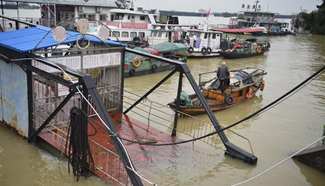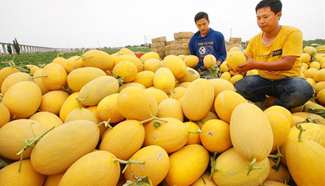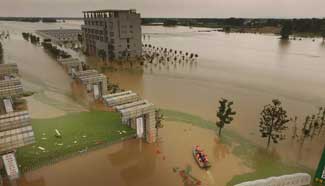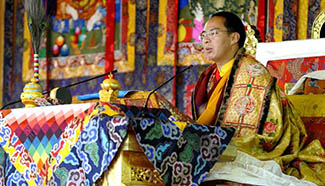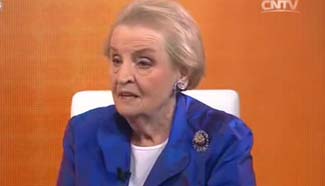by Emad Drimly
GAZA, June 27 (Xinhua) -- Palestinians, during the Muslim fasting month of Ramadan, have got the chance to watch "The Warrior," a locally-produced drama series that cast light on the decades-long Palestinian-Israeli conflict.
For decades, Palestinians in the Gaza Strip used to follow Egyptian and Syrian drama series that tackle social issues in their societies, due to the lack of production facilities in the coastal enclave.
The Warrior, whose first season went on air last Ramadan, is produced by the Al-Aqsa TV channel, which is operated by the Hamas movement.
It shows the conflict between the Palestinians in the occupied territories and the Israeli army and Jewish settlers. It also touches on the issue of Palestinian prisoners in Israeli jails.
"The production of the drama series is the biggest ever in Gaza, where there is no cinemas or media production houses or art institutes," Mohammed Khalifa, director of The Warrior, told Xinhua.
Khalifa, who has already made four movies, said the show is a socio-political work, reflecting the reality of the Palestinians living under occupation.
In the past six years, Israel and Hamas have been engaged in three major wars that claimed the lives of thousands of Palestinians and Israelis.
Hundreds of homes have been destroyed and thousands of people have been made homeless due to the military conflict between Israel and Palestinian militant groups.
In an encouraging move to the Palestinian drama making, the 32-episode series is also being aired by a Jordanian channel and a Tunisian TV station.
"We have suffered much during the making of the series due to the lack of media production houses in Gaza," Khalifa said. "The quality of the work had been negatively affected because we had to film in open areas."
Khalifa said the budget of the drama series is very modest, adding that the blockade Israel has been imposing on Gaza since 2007 has also made it difficult for him to bring in up-to-date equipment.
According to Khalifa, there are no more than 12 people in the directing team, and all of them are employees of Al-Aqsa TV. About 300 actors and actresses from the Gaza Strip participated in the drama making.
The main character in "The Warrior" is a young Palestinian named Nidal Rihani, a role played by actor Waleed Abu Jayyab.
"Rihani in Season 1 found himself confronting the Israeli oppression and injustice, which led him to establish a resistance cell," Abu Jayyab told Xinhua.
The drama in this season shows Rihani's life in Israeli prisons, reflecting a general view of Palestinians inside Israeli jails, especially those on hunger strikes.
"I feel really happy for the attention the Arab and Palestinian viewers pay to the series," he said. "I hope this experience will lead us to make better dramas in the future."
In addition to the military confrontations and the issue of the prisoners, the show also discusses the phenomenon of collaborating with the Israeli army, which is considered a disgrace in the Palestinian society.
Last year, a Turkish TV channel aired The Warrior, making it the first Palestinian show broadcasted by a foreign TV station.
In an attempt to promote the show and grab the attention of Palestinian audience in Gaza, producers placed large advertisements in public squares and on roadside billboards across the seaside enclave.
Saad Ekrayem, head of the Palestinian art forum in Gaza, told Xinhua that the series "has already achieved a notable leap in the Palestinian resistance drama in terms of script, production and performance of actors."
Ekrayem said that such works keep the aspirations of seeing Palestinian drama more powerful, which may help in the establishment of academies for generating well-educated artists and drama makers.
"We need to treat the technical weakness of domestic production because the cumulative experience is not enough," Ekrayem said. "The blockade of Gaza has also reduced chances to achieve the desired development in the drama field."


